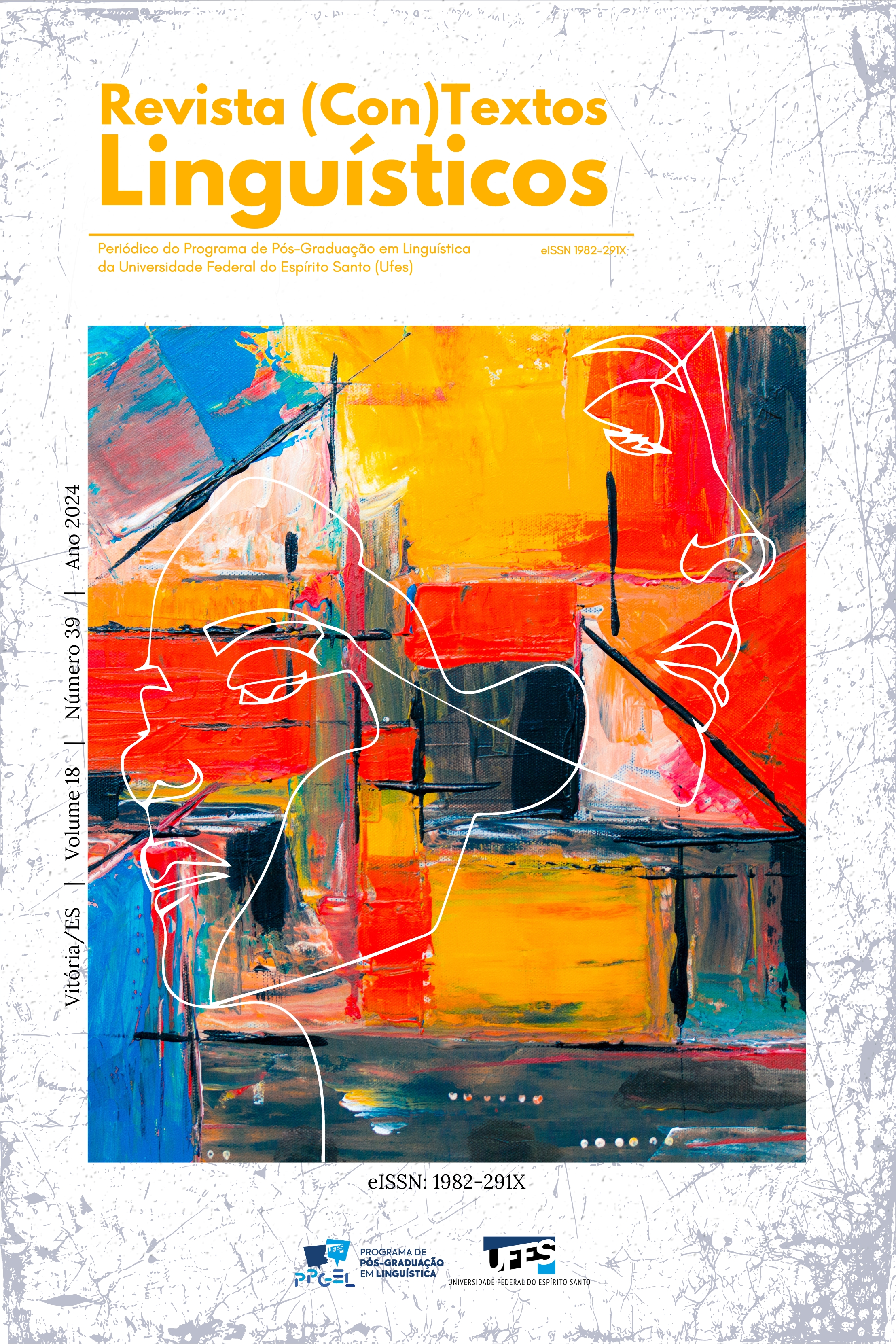The occurrence of the forms of address tú and usted in valencian community
discursive relief in focus
DOI:
https://doi.org/10.47456/rctl.v18i39.43920Keywords:
Forms of address, Discursive relief, Valencian SpanishAbstract
This research aims to analyze the occurrence of the forms tú and usted in oral Valencian Spanish, via discourse plans. Considering language as an adaptive system, functionally oriented to meet the communicative needs of speakers in specific contexts, this study was based on the theoretical assumptions of Linguistic Functionalism, more specifically that of the North American strand (Givón, 1995 And 2001; Hopper, 1979; Hopper; Thompson, 1980). We analyzed the data, which was obtained from 6 semi-structured interviews from the Proyecto para el Estudio Sociolingüístico del Español de Valencia (PRESEVAL) corpus. The occurrences analyzed were coded and quantified for the purposes of frequency of use. The results showed that the less marked form tú was predominant in a context that was also less marked, i.e. figura. Similarly, this pronoun was also favored in discourse level background 01, since this is a less marked context than background 2. Surprisingly, the form usted, although with a low register, was not favored in discourse level background 2, a context which requires more cognitive processing and in which information does not flow as smoothly as in background 1. The association of these forms with discourse plans reveals distinct patterns, highlighting how they influence the organization of discourse and adapt to different communicative contexts. These observations corroborate the importance of the functionalist marking principle in understanding the use of these forms of address.
Downloads
References
ÁLVAREZ MURO, A.; CARRERA DE LA RED, M. El usted de solidaridad en el habla de Mérida. In: SCHRADER-KNIFFKI, M. (ed.). La cortesía en el mundo hispano: nuevos contextos, nuevos enfoques metodológicos. v. 15. Madrid/Frankfurt: Iberoamericana/Vervuert, 2006. p. 117-130.
BUZÓN GARCÍA, J. M. La expresión de la futuridad en el español de Valencia. 2013.
f. Tese (Doutorado em Estudos Hispânicos Avançados) - Facultat de Filologia, Traducció i Comunicació, Universitat de València, Valência, 2013.
CALDERÓN CAMPOS, M.; MEDINA MORALES, F. Historia y situación actual de los pronombres de tratamiento en el español peninsular. In: HUMMEL, M.; KLUGE, B.; VÁSZQUEZ LASLOP, M. E. (org.). Formas y fórmulas de tratamiento en el mundo hispánico. México, D.F.: El Colegio de México, Centro de Estudios Lingüísticos y Literarios, 2010. p. 195-222.
CHEDIER, C. M. Perfil de figura/fundo em crianças com e sem queixas escolares. 2007. Dissertação (Mestrado em Linguística) - Programa de Pós-Graduação em Linguística, Universidade Federal do Rio de Janeiro, Rio de Janeiro, 2007.
CUNHA, M. A. F. Funcionalismo. In: MARTELOTTA, M. E. (org.). Manual de Linguística. São Paulo: Contexto, 2017. p. 157-192.
CUNHA, M. A. F.; COSTA, M. A.; CEZARIO, M. M. Pressupostos teóricos fundamentais. In: CUNHA, M. A. F.; OLIVEIRA, M. R.; MARTELOTTA, M. E. Linguística Funcional: teoria e prática. São Paulo: Parábola Editorial, 2015.
DUBOIS, S.; VOTRE, S. J. Análise modular e princípios subjacentes do funcionalismo linguístico. In: VOTRE, S. J. (org.). A construção da gramática. Niterói: Editora da UFF, 2012. p. 49-71.
GIVÓN, T. Functionalism and Grammar. Amsterdam; Philadelphia: John Benjamins, 1995.
GIVÓN, T. Syntax: a functional-typological introduction. v.1. Amsterdam/ Philadelphia: John Benjamins, 2001.
GÓMEZ MOLINA, J. R. El español hablado de Valencia: Materiales para su estudio I. Nivel sociocultural alto. Valência: Universitat de València, 2001.
GÓMEZ MOLINA, J. R. El español hablado de Valencia: Materiales para su estudio II. Nivel sociocultural medio. Valência: Universitat de València, 2005.
GÓMEZ MOLINA, J. R. El español hablado de Valencia: Materiales para su estudio III. Nivel sociocultural bajo. Valência: Universitat de València, 2007.
HOPPER, P. Aspect and foregrounding in discourse. In: GIVÓN, Thomas (org.). On understanding grammar. Nova Iorque: Academic Press, 1979.
HOPPER, P.; THOMPSON, S. A. Transitivity in grammar and discourse. Language, v. 56. Baltimore, 1980.
LIMA, J. V. M.; COAN, M.; PONTES, V. O. Variação entre as formas de tratamento no espanhol oral de Valência. Acta Scientiarum. Language and Culture, v. 41, e47584, p. 1- 11, 2019.
NEVES, M. H. M. Gramática funcional: interação, discurso e texto. São Paulo: Contexto, 2018.
PONTES, V. O.; SILVA, R. F. Marcação / não marcação das formas de tratamento tú, vos e usted via planos discursivos. Domínios de Linguagem, Uberlândia, v. 17, p. 1-24, 2023.
SILVEIRA, E. O aluno entende o que se diz na escola. Rio de Janeiro: Ed. Dunya, 1997.
Downloads
Published
Issue
Section
License
Copyright (c) 2024 Revista (Con)Textos Linguísticos

This work is licensed under a Creative Commons Attribution-NonCommercial 4.0 International License.
Authors assign the copyright of the article to the publisher of Revista (Con)Textos Linguísticos (Graduate Program in Linguistics, Ufes), if the submission is accepted for publication. Responsibility for the content of articles rests exclusively with their authors. The full or partial submission of the text already published in this periodical to any other periodical is prohibited.
This work is licensed under a Creative Commons Attribution-NonCommercial 4.0 International License.



